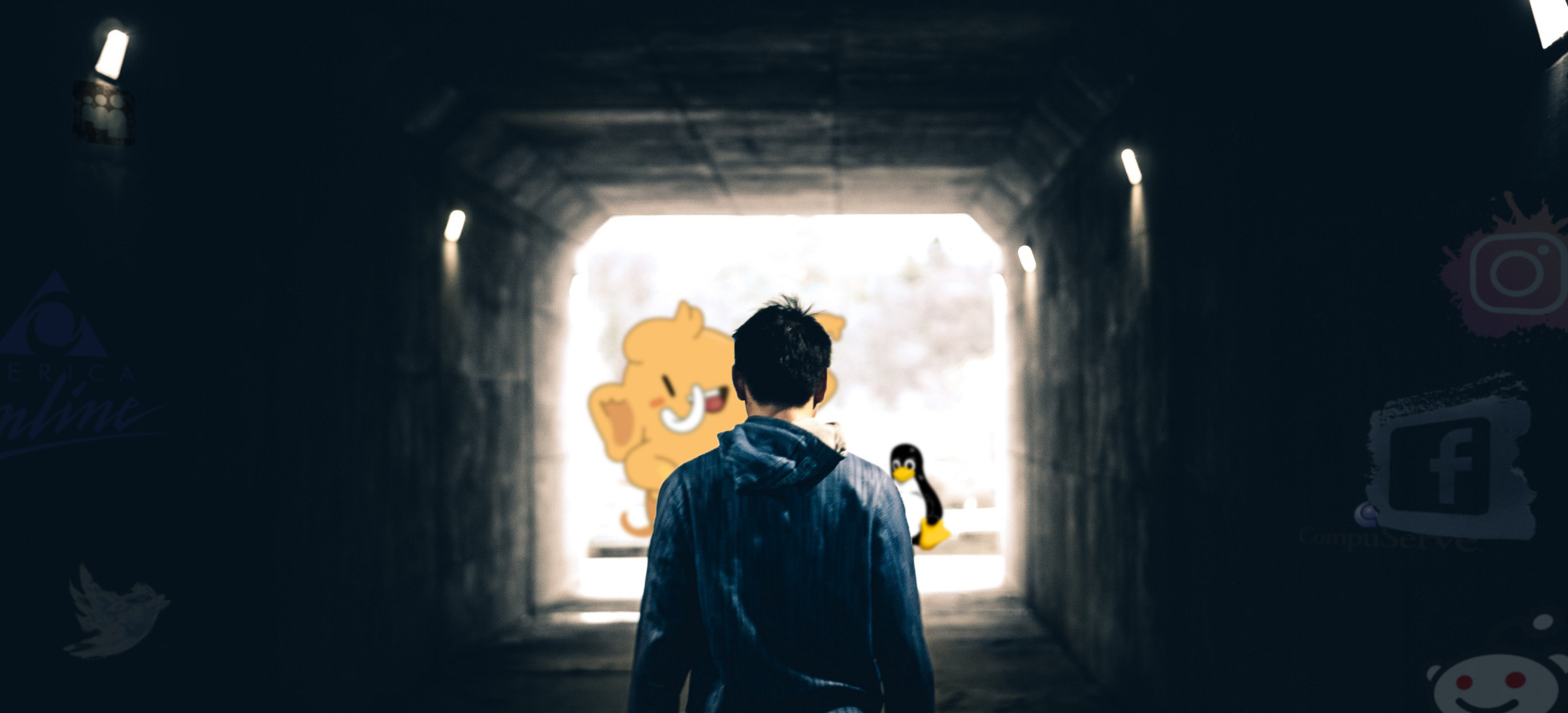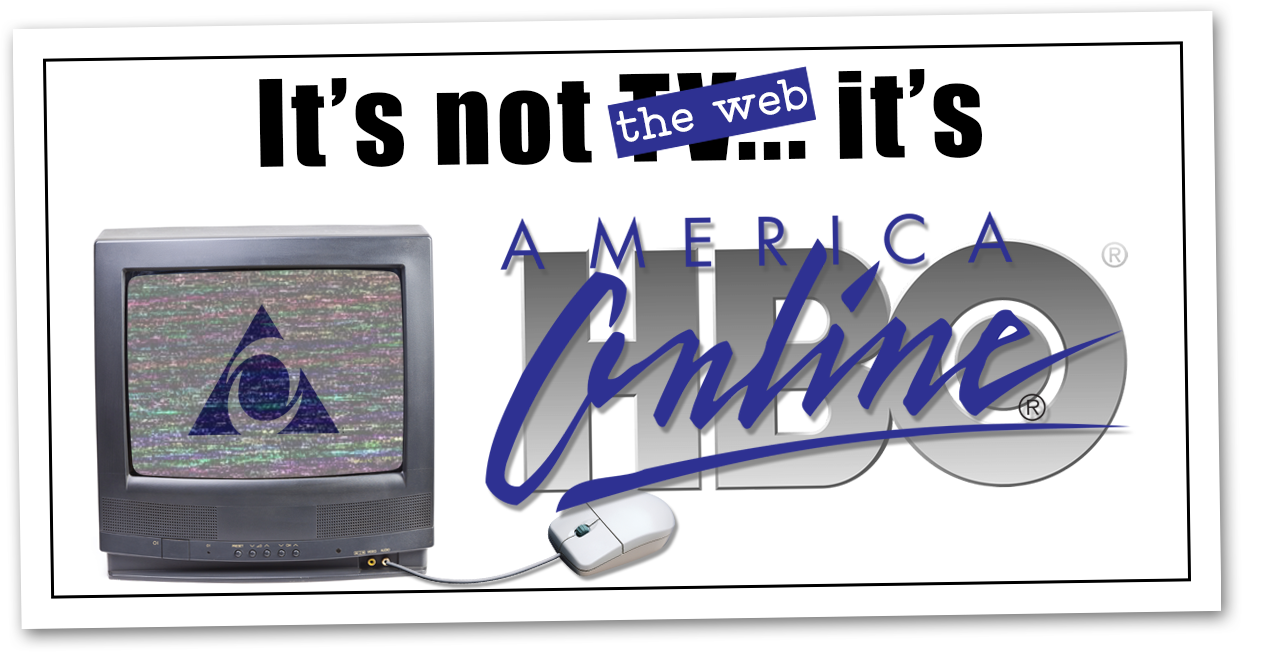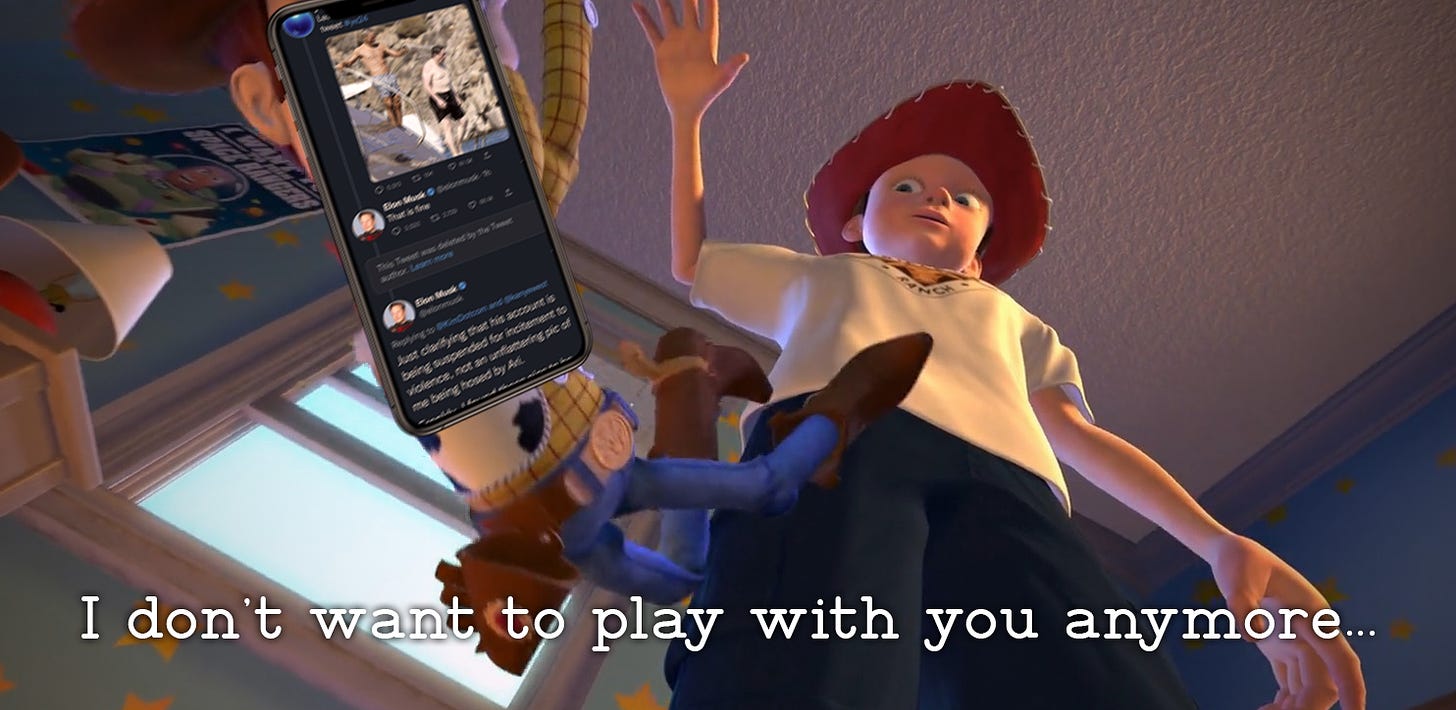“No utopia can ever give satisfaction to everyone, all the time . . . Even when the external world has granted all it can, there still remain the searchings of the mind and the longings of the heart.” ― Arthur C. Clarke
Being able to communicate worldwide instantly has advantages. But the for-profit companies who are in charge of these “digital town squares” care more about quantity than quality.
Every time a corporation has arisen that thought they could control the entire internet and it’s users, they eventually have been reduced to irrelevancy. Why is this?
America Online is the earliest big example that comes to mind of a company that tried to dominate the entire internet. AOL was essentially a service that took something new, wild and confusing (the web) and made it simple and navigable to the layperson. AOL filled a niche with what should have been a totally reasonable business model; customers pay AOL to make their connecting/surfing experience easy and safe(r), and off they go.
But AOL didn’t stop at being a middleman for the digitally illiterate, they guessed that eventually the web would mature and become more accessible, the populace would become more technically adept, and that other ISPs would step up and make the on-boarding process simpler for consumers. But instead of evolving and learning to compete in an increasingly competitive landscape, AOL tried to confuse it’s own customers and lock them inside a walled garden. AOL sought to fashion itself not as a portal to the internet, but as the internet.
AOL failed in this endeavor, for reasons I’ll get to in a bit- but AOL was not the last to attempt it. Many internet companies have fashioned similar “walled gardens” for their customers; many have sought to be the place which users connect, talk, and only explore the rest of the web by bringing the rest of the web to them1, and none of these pretenders have achieved long term sustainability. Facebook is the biggest and most prominent example (it’s no wonder AOL in it’s waning years tried to buy Facebook in its nascent ones) and now it too is going through a period of increasing irrelevancy.2
Why is this? What is it that makes Facebook (2006), such a hot-ticket item, but Facebook (2022) so old and busted? What makes Twitter (2012) the elite club for anyone-who’s-anyone and Twitter (2022) the opium den for outrage addicts? The platforms have only improved (technically speaking) since their creation, right? So what’s changing?
I suspect the reality is that these platforms have actually done an extremely impressive job of remaining relevant as long as they have, but that it’s the users who are showing signs that they’re outgrowing a need for these walled gardens and stepping out on their own. Just as digital society learned to branch out beyond the need for AOL’s hand-holding, users are learning that they have the tools they need for a more personalized social experience online.
The Future is Open
I’m a big fan of the open-source software movement. Open source software is not always the easiest to pick up and operate, but it’s often more precise. It’s precise not because it’s not built to be sold, it’s built to do a job. The more you learn, the more adept you become, and just by using you contribute to the movement. Not to mention that for most software, there’s a community of people out there, slowly, steadily making whatever it is easier to pick up and operate.
Take Linux for example as it’s probably the best-known open source software and it’s been around since ‘91. What else have we seen since 1991? The rise of Windows? the rise, fall, and rise again of MacOS? ChromeOS? There’s a running joke that goes: “this is the year of the Linux desktop”, the joke is that year after year, Linux remains marginal in “market share” to the other players. Linux is often described as competition to Windows and Mac; And from Microsoft and Apple’s perspective, it’s probably true that they see Linux as financial competition. But from Linux’s perspective? It doesn’t even really make sense to say that Linux has a perspective because it’s not a corporation. It’s just software. Some distributions are managed by corporations, and those corporations might see Microsoft and co as financial competitors, but the purpose of Linux is not to make money. It’s purpose is to be software. The foundation upon which Linux has been built brick-by-brick over the decades isn’t to be marketable, it’s to be functional.
While companies like Microsoft and Apple jockey for greater control of the market, the open source software people just slowly and steadily work on developing their projects. If everyone quit working on all versions of Linux, Linux wouldn’t “go out of business”, it would just… be there until someone picked it back up. For the people who use Linux the “year of the Linux desktop” arrived long ago. Armed with knowledge (and a broader community of support) those people felt equipped to leave the metaphorical nest. They have outgrown a need to be hand-held by companies like Apple and Microsoft.
To be honest, I don’t think a “year of the Linux desktop” moment when a majority of personal devices run open-source operating systems is coming anytime soon. But what already exists is not going away anytime soon either. And as the big for-profit tech companies brawl, the FOSS movement is always there in the background, evolving and growing. I think that there will eventually come a time when "Linux on desktop"3 will be accessible enough for use by the majority, and when it is- it will be completely impossible for any for-profit operating system to compete with it. Because the foundations it will be built upon are stronger than any forces financial markets can throw at it.
I think we’re seeing the first signs that the seeds have sprouted for a similar open and decentralized version of social media now too. And it will continue to grow.
Free (libre vs gratis) Speech
The term “free speech” is vague and can mean different things to different people. So for the purposes of this essay let’s use “constructive speech". Constructive speech is a conversation you might have with a group of friends or colleagues with a shared goal in mind. That goal is rarely clearly articulated, and could be as simple as deciding where to eat, or more complicated, like deciding how you all feel on a given political topic. Constructive speech is superficially imprecise, meandering and loose, but if you zoom in you'll see it is actually comprised of many small intentional acts. A constructive conversation is more like navigating a river, or forging a trail than it is like building a house. It is conversation where people feel safe to speak vulnerably. To speak aloud unfinished thoughts without fear of judgement, manipulation or being intentionally misinterpreted because it is known by all participants that everyone is working in good faith towards the goal. Even if the “goal” is something intangible, like social bonding. Or deciding on a goal.
In IRL conversations, constructive speech leans heavily on long-evolved mechanisms like body language and vocal tone to indicate intent and earnestness towards the shared goal. On the internet, those mechanisms are unavailable, and so they get substituted with culture, if small enough, and rules and codes of conduct if larger than a few dozen people. In order to have constructive conversation online, participants are asked to follow specific guidelines in order to demonstrate their earnestness and authenticity. Those unwilling (or unable) to follow the guidelines can be removed from the conversation. Group members can join and leave this framework at will, and the conversation can keep going. The conversation can be independent of the participants. But if you want to bear intellectual fruit from hundreds of strangers who can’t see each other’s faces… you’re gonna need some ground rules.
Remember it is not the goal of social media companies to facilitate constructive conversation or bear intellectual fruit. They might desire those things as a secondary goal, but their ultimate goal is to make money. Not because they’re evil exactly, but because without it they’ll die.
I’ve said before that Twitter “isn’t a town square, it’s an arena”. But a more apt comparison might be a more mundane one: Twitter is not the town square of a bustling metropolis, it is a shopping mall in suburbia. People are really only hanging out on these big, centralized commercial platforms because where they live there’s nowhere better to do it. And like the suburban mall, the only way to truly, authentically, exist on these platforms is to be doing some form of commerce.
It’s very hard to have any kind of constructive conversation on social media because there are always going to be people there who seek to disrupt whatever it is you’re talking about (and it often only takes one). Those who seek to delay, argue, or muddy the waters of constructive conversation are locked in the shopping mall with you on purpose because they drive engagement, and therefore- profits. Any rules —ie: the social guardrails in place when body language and vocal tone can’t work— exist only in service of profitability. This is why for-profit social media will always eventually end up “just toxic enough” to the point that users are engaged but don’t quit.
You are free to say pretty much anything you want on social media, but you are not free to cordon off a separate conference room of your own design and control who gets invited. You are not free to “brainstorm” or “spitball” with like-minded souls and an understanding of no malicious intent. The two options for communication are:
Publicly, accessible by the entire world.
Privately, like in DMs.
And yet pretty much all speech that qualifies as “constructive” falls somewhere between the two. Accessible, yet intimate. Open yet disciplined. Not a mall, but a bar. A cafe. A library.
Conversation decentralization
The best way new ideas and creative solutions come about in society is when space is made for them. New York writers in the 1960s would meet at the White Horse Tavern and share ideas. The Stonewall Inn a short walk away is an iconic gay bar and site of the famous uprising that bears its name. Bars sell beer to pay their bills, but demand for beer is not why bars exist. Different bars attract different kinds of clientele, but ultimately anyone can (hopefully) go to any bar they choose. A gay writer in the 1960s might have split time between White Horse and Stonewall, despite what I’m sure were different conversation topics and social mores.
The internet could be like this too; full of many diverse yet interconnected spaces, and to a degree it always has been. But right now a lot of people are all hanging out in big flashy internet shopping malls, wondering why they can’t make friends and why their most recent purchase isn’t making them any happier.
Decentralized online speech doesn’t mean “one space with no rules” it means “many interoperable spaces with specialized rules”. As I said before- specialized rules are necessary for constructive conversation to happen in places where people don’t know one another, like the internet. For example: 4chan has few rules, and has very little constructive conversation since it’s impossible to tell who is being earnest and who is trolling. On the opposite end, Wikipedia has many rules and even though it can appear chaotic and messy if you peek behind the scenes, the result of these “messy” conversations is a free encyclopedia who’s accuracy rivals Britannica.4
The knowledge barrier to entry for editing Wikipedia is high (as anyone who has tried to fix an inaccuracy and had their edit reversed for some obscure bureaucratic reason can attest) and most people aren’t looking to have such restrictive codes of conduct in their casual conversations. But Wikipedia isn’t trying to be everything to everyone, like Facebook or AOL before it. It’s trying to be exactly what it is. One place on a decentralized internet.
A brief note about “Web3”
You’ll often see “Web3” stans describe their imagined digital utopia as “decentralized”. It’s a compelling sales pitch. It’s true that a lot of people are fed up with how the big players run things, and the idea of an internet without the Zuckerbergs, Musks, Dorseys or Huffmans controlling the levers of mainstream communication is attractive. But something Web3 people can never answer, is how exactly adding another layer to the internet is going decentralize anything more than it already is. It’s true that most Web3 proponents seek to break up the big tech companies, but only insofar that they can take their place at the top. Much of the Web3 movement is the 1% battling the .01%.
The truth is- the structure of internet has always been decentralized and we don’t need to add any new layers to it. The web was created based upon principles of free communication, and those principles remain baked in to the foundations of the modern web. This is partly reason I believe that true dominance by a single company cannot meaningfully last. The cultural bedrock of the internet is no bedrock. It’s like building on quicksand. Eventually the ground will shift, and no amount of money spent on structural support can overcome an insecure foundation.
Facebook has billions of users, more money than God, and even they don’t seem able maintain their hegemony. The narrative usually goes that “nothing lasts” because tastes change and “the next cool thing” comes along. Facebook was the new MySpace, which was the new Friendster, etc etc. But I think there’s more (or rather, less) to it than that. If it were true that every internet giant eventually just gets out-hipped by the New New Thing™, how does one describe what is happening to Facebook now? TikTok is the new hotness, but it’s not exactly a Facebook competitor. Is it possible that TikTok is just stealing all the eyeballs that used to be on Facebook? Maybe, and to a degree. But I think it’s more likely that Facebook’s users are realizing that there are simpler, better, ad-and-algorithm-free ways to do the things they do on Facebook elsewhere. Think about it- if Facebook had any real world utility, surely it’s dominance wouldn’t be threatened by… short form videos?
Although Elon Musk’s purchase of (and recent changes to) Twitter likely lit a fire under many butts to try out to various Mastodon instances, the open source Mastodon software has already been around for a few years, growing slowly and establishing independent-but-interconnected communities. It’s growing a bit faster now as Twitter becomes increasingly unbearable, but the countless articles calling Mastodon a “competitor” to Twitter are missing the same point that those describing Linux as “competing” with Windows or Mac are. It’s not one thing, it’s many interoperable things.
Mastodon has a slightly higher barrier-to-entry than Twitter. That’s a fact. On the decentralized web (aka, the Web) there is no overseeing corporation to hold your hand and explain how it works. But there is a community. And maybe a small barrier-to-entry will help ensure that the people who are participating in these spaces have chosen to be there.
Culturally constructive communities
Personally, I’m not entirely sold on the idea of any kind of social network that encourages users to “hang out” or to consume content in moments of boredom. If you know anything about this newsletter it’s that I believe the internet should foremost be viewed as a tool to use as needed, lest we entertain ourselves to death. But it would be naive (and pretty hypocritical) of me to assume that this astounding sprawling electronic network built for human communication had no cultural utility whatsoever.
What we have now on the internet is a handful of big, surburban-style shopping malls where people are misleadingly told “come here to participate in culture” and it’s all coming out toxic and horrible because that’s just not what a shopping mall is good for. What we need before we can have real digital town squares is digital towns.
Just as when everyone outgrew the need for AOL, and learned to navigate the wild web without its “protection”, more people appear to be realizing that Facebook is not a healthy way to stay connected with friends, and that Twitter is not a productive place to debate policy. Asking if there will ever be a “critical mass exodus” is missing the point. The landscape shifting and I feel a growing optimism that our current way of “doing social media” has peaked. Every day more people are realizing the power their own participation gives these large, commercial platforms, and are re-evaluating their own principles. Some are seeking a more trustworthy digital foundation on which to have more constructive communication. And so they look deeper than Wall Street and Silicon Valley. They’re looking to the people and platforms that are being constructed from the decentralized principles the internet is made of. Brick-by-brick they are laying the foundations for what will become a more open and culturally constructive future online.
Also I made a Mastodon account here. I don’t know if I’ll use it much! But you can follow me there too if you like.
Some links for further reading that informed this essay:
PSA: Do Not Use Services That Hate The Internet From Jamie Zawinski
Where did the most Twitter users go after leaving Twitter? From Tim Chambers
Social Networks Are Going Much, Much Smaller from Caroline Sinders at Slate
Mastodon Is Idiot-Proofed at the Top from Maria Bustillos at Popula
Consider how most people on social media don’t actually read the articles, just react based on the headline. Yes, there is an external URL, but the platforms don’t actually want anyone to leave.
Even Google is showing signs that it’s dominance may be peaking, as privacy focused rivals like DuckDuckGo grow (slightly), and more shoppers are adding “reddit” to their search queries in order to bypass Google’s increasingly useless and seo-optimized front page results.
Or whatever we’re calling our devices in the future
It should go without saying that Wikimedia inc. is a nonprofit, and Wikipedia’s rules exist to serve a priority other than user engagement.








Just found your newsletter lately. Finally sat down to read through some past articles and WOW. This is great work. Thank you for writing this. 🙏🏻